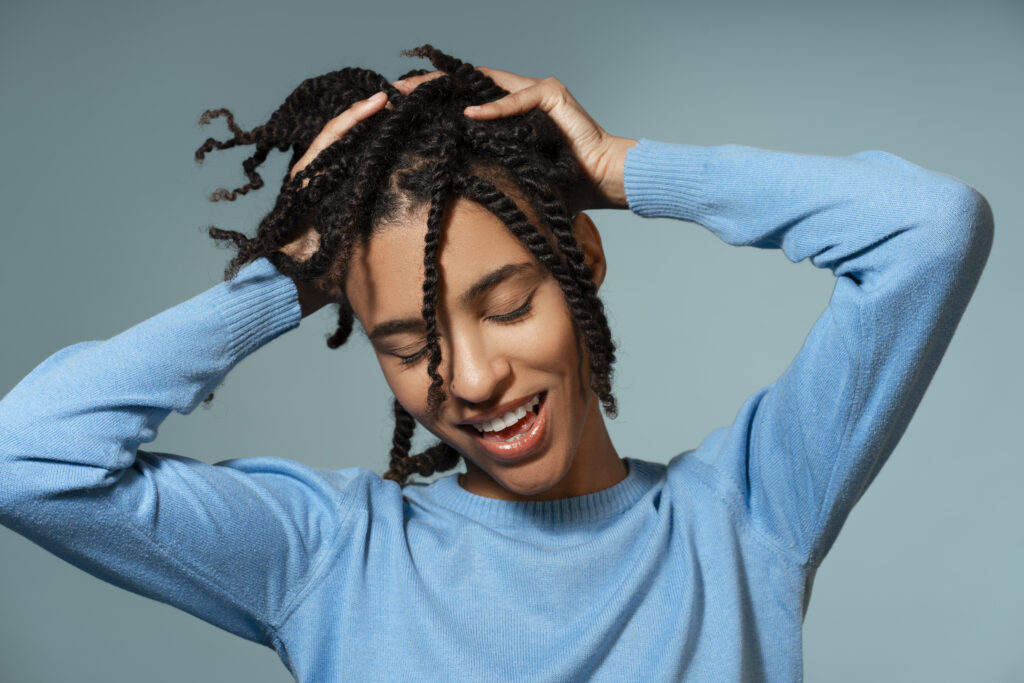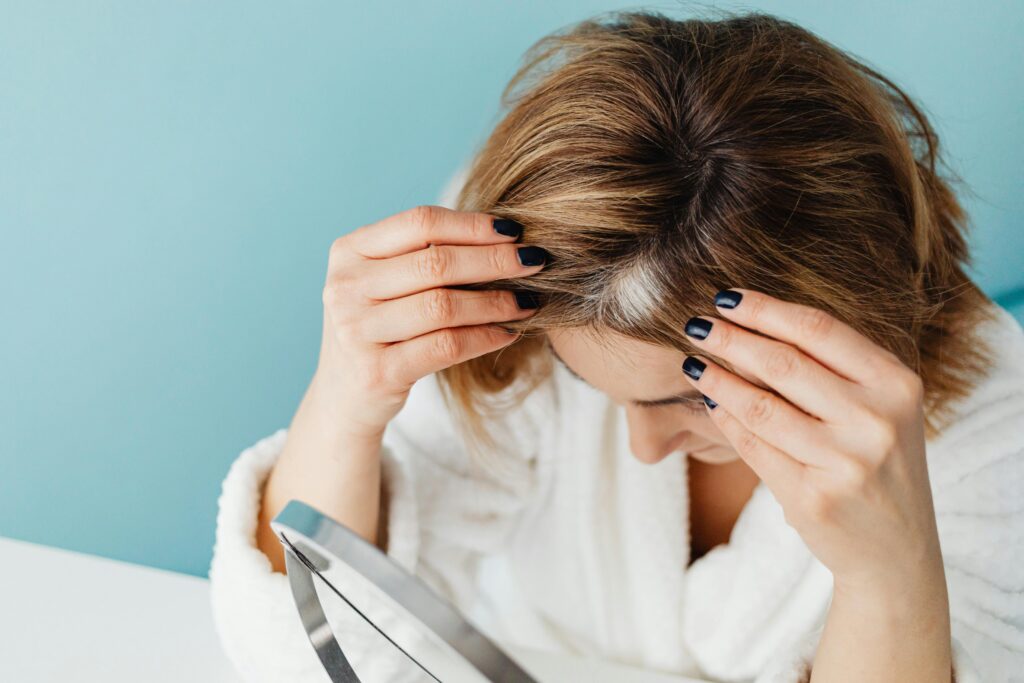
Some people tend to focus only on the hair strands when caring for natural hair, investing in different products and treatments to make it beautiful and healthy. However, what we often overlook is the foundation of our hair’s health—the scalp. Just as fertile soil is essential for the growth of plants, a healthy scalp is essential for the growth and health of hair.
The scalp serves as the bedrock from which our hair emerges. A neglected scalp can lead to many issues, including dandruff, itching, inflammation, and even hair loss. If the skin on other parts of your body requires care and attention, why do you think the skin on your head should be ignored? To maintain optimal condition, the scalp requires it’s own regimen. Yes
In this article, we will learn about the importance of Scalp care, common scalp issues, and, most importantly, how to care for the scalp.
The Importance of Scalp Care

Promotes Hair Growth
A healthy scalp provides optimal conditions for hair to grow and thrive. If you are trying to grow your hair longer, focus should be on your SCALP (where the hair grows out from) and tips (to preserve the already grown hair). You need a healthy scalp to have healthy hair. When the scalp is free from issues like excessive oiliness, dryness, or inflammation, hair follicles can function properly, leading to stronger, thicker, and faster hair growth.
Prevents Hair Loss
By maintaining a healthy scalp, you can reduce the risk of Issues such as dandruff, scalp infections, or inflammation which contributes to hair loss.
Reduces Dandruff
Dandruff is often caused by a combination of factors,, including dry scalp, excess oil production, and fungal infections. Keeping the scalp clean and balanced helps minimize dandruff flakes and itchiness, promote a more comfortable scalp, and save you the embarrassment of dandruff flakes.
Improves Hair Texture and Appearance
A healthy scalp provides the perfect environment for hair to look and feel its best. It helps to regulate natural oil production, preventing greasiness or dryness that can affect hair’s texture and appearance.
Enhances Blood Circulation
Blood circulation in the scalp is essential for the effective delivery of oxygen and nutrients to the hair follicles. Maintaining a healthy scalp through regular cleansing and massaging can improve blood flow, promoting healthier hair growth.
Supports Styling and Maintenance
A clean and healthy scalp makes it easier to style and manage your hair. It reduces issues like product buildup, which can weigh down the hair and make styling more challenging. With a healthy scalp, hair is also more responsive to treatments and styling products.
Boosts Confidence
A healthy scalp not only contributes to physical well-being but also to mental and emotional health. It reduces discomfort and self-consciousness associated with scalp issues like dandruff or hair loss, allowing you to feel more confident and comfortable in your own skin.
Common Scalp Issues

Some common scalp issues with their causes and possible solutions are listed below:
Dandruff
Dandruff is one of the most common scalp issues many people encounter. It is characterized by flaky, white, or yellowish scales on the scalp and sometimes accompanied by itching. Dandruff can be caused by various factors, including fungal infection, dry skin, oily skin, sensitivity to hair care products, or a combination of these factors.
To treat dandruff, use anti-dandruff shampoos containing active ingredients like zinc pyrithione, selenium sulfide, ketoconazole, or coal tar. Also, wash hair regularly with a gentle shampoo to maintain good scalp hygiene.
Psoriasis
Psoriasis on the scalp appears as thick, red patches covered with silvery scales. It can be itchy and sometimes painful. It is an autoimmune condition where the immune system mistakenly attacks healthy skin cells, leading to rapid skin cell turnover.
To reduce inflammation and scaling, psoriasis can be tackled by using medicated shampoos containing ingredients like coal tar, salicylic acid, or corticosteroids. A dermatologist should also be consulted for treatment.
Dry Scalp
Dry scalp is characterized by itching, flakiness, and tightness of the scalp due to lack of moisture. People often mistake dry scalp for dandruff because they have similar characteristics. But then, they are caused by different things. Dry scalp is caused by lack of moisture in the hair, harsh hair care products, excessive washing, etc.
To prevent/ treat dry scalp you can use moisturizing shampoos and conditioners, limit the use of heat styling tools, massage the scalp with oils, and increase your water intake.
Seborrheic Dermatitis
This scalp disease causes red, itchy, and greasy patches on the scalp, often accompanied by dandruff. The exact cause of seborrheic dermatitis is unknown, but factors like yeast overgrowth (Malassezia), hormonal changes, stress, and genetics can be responsible.
If you suffer from Seborrheic Dermatitis, you should use medicated shampoos containing antifungal agents like ketoconazole, selenium sulfide, or zinc pyrithione to reduce yeast growth and inflammation. You should also wash your hair regularly and apply antifungal creams and lotions prescribed by a dermatologist.
Scalp Acne
Scalp acne appears as small, with red bumps or pustules on the scalp, and can be itchy and painful. It is caused by excess oil production, bacteria buildup, sweat, hormonal changes, or hair care products clogging hair follicles.
To treat Scalp acne, use gentle, non-comedogenic hair care products and avoid heavy styling products that can clog pores. In addition, use tropical treatments containing benzoyl peroxide, salicylic acid, or sulfur to reduce inflammation and unclog pores. Do not forget to wash your hair regularly.
How to Care for the Scalp

Cleansing
The first thing you can and should do to have a healthy scalp is regularly clean it. In fact, proper shampooing involves focusing on your scalp to cleanse it of dirt, dust, and buildups that can clog pores and impede hair growth. In the process of doing that, your strands will also be cleansed.
The importance of cleansing the scalp cannot be overemphasized. You should do it regularly. If you don’t have the time or ability to give your scalp a good cleansing, visit a good hair care salon to have it done for you. However, when shampooing, remember that harsh shampoos containing sulfates and other aggressive detergents can strip the scalp of its natural oils, leading to dryness and irritation. Opt for gentle, sulfate-free cleansers that effectively cleanse without causing extreme dryness.
Exfoliation
Exfoliation is a crucial step in scalp care. It helps to slough off dead skin cells and unclog follicles, allowing for better absorption of nutrients and improved circulation. To exfoliate, use a scalp scrub or an exfoliating treatment. Also, look out for products containing ingredients such as salicylic acid, tea tree oil, or gentle fruit acids to gently exfoliate without causing irritation.
Moisturizing
Like the skin on our face and body, the scalp also requires adequate hydration to maintain health and vitality. Dry scalp can lead to itchiness, flakiness, and discomfort, so it’s essential to incorporate moisturizing products into your scalp care routine. You can moisturize your scalp through different means including prepooing, hot oil treatments, and massages with oils.
pH Balancing
Maintaining the pH balance of the scalp is crucial for its overall health and function. That is why every good hair product formulator must check for pH balance after production. An imbalanced scalp can lead to excess oil production, dandruff, and irritation. Look for products specifically formulated to balance the scalp’s pH, or incorporate natural remedies such as apple cider vinegar rinses into your routine to help bring balance.
Protection from Extreme Sunlight
Just as we protect our skin from the sun’s harmful rays, it’s essential to shield our scalp as well. Too much exposure to sunlight can cause damage and premature aging to hair. Wear a hat or scarf when exposed to prolonged sunlight, and avoid using hot styling tools excessively, as they can dehydrate the scalp and weaken the hair shaft.
In conclusion, always remember that your scalp is part of your skin, and so, should not be ignored. And since a healthy scalp is the foundation of healthy hair, do yourself good by investing the time and effort to nurture it. Caring for your scalp is essential for maintaining healthy, vibrant hair.










